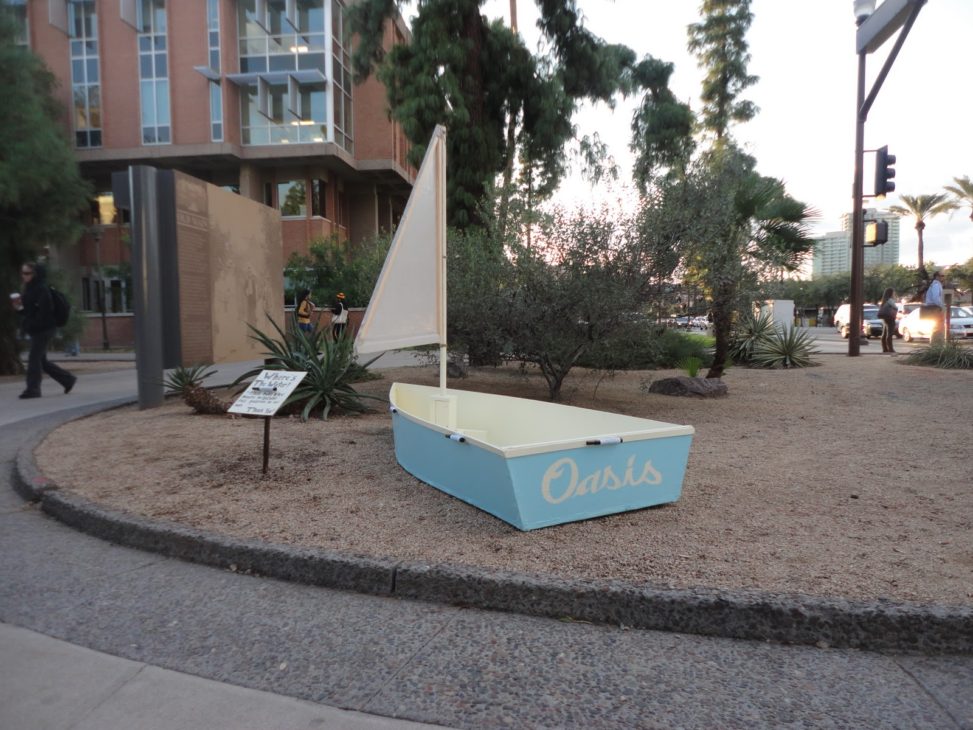UNIT IV: Mass and Form
UNIT V: Scale and Context
OBJECTIVE: To introduce both traditional and non-traditional approaches to the concept of mass as applied to three-dimensional form. To explore how an object’s intended use, materials, context, and installation can influence its aesthetic and social make up.
GOAL: Create a site-specific boat sculpture that examines human relationships.
PROJECT: Awash, Adrift, Away
PROCESS:
- Listen to presentation on boats, art, and boat art.
- Brainstorm with your team about a relationship topic that you’d be interested in using as inspiration for your boat. Be sure to write it down.
- Parse your brainstorm into a concept map.
- Sketch out at least 10 different ideas for boat designs
- Using plain paper, make maquettes for at least 3 of your sketches. A maquette is a quick model made without scale.
- Again using paper make a scale model of one of your maquettes. Use the simple 1”:12” scale.
- Measure your model to make sure one or two people could fit in it comfortably. Try drawing the deck space out full scale in chalk on the parking lot to be sure.
- Divide your model into flat panels that can be cut out of plywood. Lay them out on pieces of 4”x8” paper to see how to get the most millage out of your plywood.
- Participate in the woodworking safety demonstration.
- Using the t-square and a scale grid to transfer your model templates to the plywood.
- Cut out your plywood pieces.
- Assemble the sides, transoms, and frames using 1”x1” cleats, screws, fiberglass tape, and polyurethane glue. Let dry. Remember to drill pilot holes for all screws.
- Cut out the bottom to fit and attach it in a similar manner.
- Install any seats, dragon heads, lanterns, or other embellishments you want to add.
- Paint the boat with exterior grade latex house paint, outside, and on a tarp.
- Hooray! You have a boat! Take a sail in Tempe Lake…
READING: Launching the Imagination chapters 9, 10, 11, 12
VOCABULARY: form, function, analogy, appropriation, layering, metaphor, cliché, hybrid, iconography, simile, stereotype, port, starboard, aft, fore, bow, stern, keel, rudder, transom, strake, mass, density, weight, gravity, simulation, surface, tactile, traditional/non-traditional, subtractive, additive, synthetic, representational, nonobjective, abstract
REFERENCES: Survival Research Laboratory, Richard Deacon, Kain Tapper, Patricia Renick, Dale Chihuly, Frank Bolter, Tom Loeser, Nancy Rubins, Matthias Pliessnig
MATERIALS: 2 sheets of ¼” exterior plywood, 2 2”x2” pine studs, 1 tube polyurethane glue, fiberglass tape, screws, tie wire, exterior latex house paint – for one boat. Paper, pencils, masking tape – for model.
TOOLS: Tape measure, pencils, T-square, saw horses, jig saw, hand drill, screwdriver, paintbrush, clamps, sandpaper
GRADING: 25pts
|
|
|
|
|
|
|
|
NOTES: Work in teams of three on one boat.
GLOSSARY:
- Bow – Front of a boat.
- Stern – Back of a boat.
- Starboard – Right side of a boat, marked with a green light
- Port – Left side of a boat, marked with a red light
- Transom – Back side of a boat, some boats that are not pointy also have a transom at the bow as well
- Stem – A boat with a pointed bow usually has a thicker piece of wood where the two sides meet
- Skeg – A fin permanently fixed to the bottom of a boat to help it travel in a strait line
- Deck – The top sides of a boat, some boats have no deck such as canoes
- Frame – Creates a bulkhead or floatation chamber when combined with the sides, deck, and hull
- Aft – Towards the stern
- Fore – Towards the bow
- Arrr – Pirate for “come get some” or “yes” when combined with matey.



